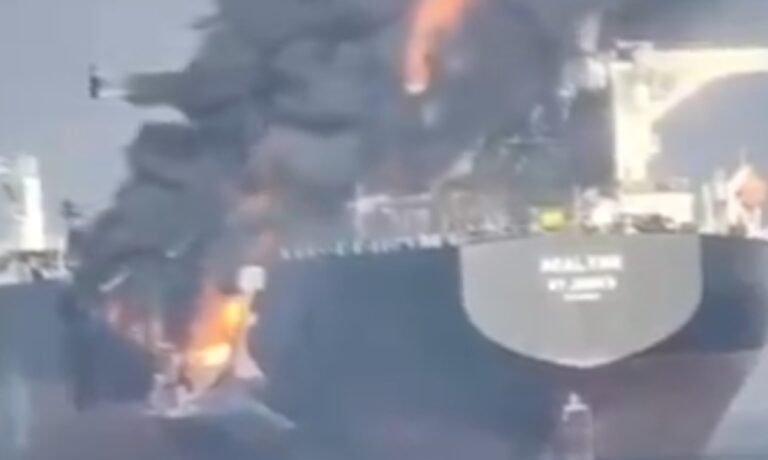An Oil Spill in the Gulf of Oman: Navigational Misjudgment and Electronic Interference
An oil spill is growing rapidly in the Gulf of Oman after Tuesday’s spectacular collision between a Frontline VLCC and a suezmax belonging to Russia’s shadow fleet.
The accident occurred at 1:14 am Dubai time on Wednesday between two tankers, the 23-year-old Adalynn suezmax and the Liberian-flagged Front Eagle VLCC, near the Khorfakkan anchorage in the Gulf of Oman. The impact resulted in a fire aboard the Adalynn and prompted the swift evacuation of its entire crew.
Lars Barstad, the CEO of Frontline, discussed the accident on stage at Marine Money’s New York gathering yesterday, saying what had transpired was the “nightmare” for any shipowner.
He described the incident as having “a three football field long tanker fully laden with crude oil sailing at 13 knots and then all of a sudden you end up in a collision with a vessel that you don’t know who owns it, you don’t know who manages it, and you don’t know who insures it.”
Barstad highlighted the difficulty of the situation, stating that it’s customary to establish contact with the other owner to manage the situation and ensure the safety of seafarers and the environment, but this was not possible in this instance, helping to explain how “crazy” this market has become with the rise of the dark fleet.
“We’ve been very vocal on how dangerous this situation can become with the dark fleet but here we had a very, very close call of having 2m barrels of crude oil in a big sheet in the Middle East,” Barstad told delegates.
While the Frontline tanker did not spill oil, there is a slick emerging from the Adalynn, with Greenpeace reporting that as of yesterday satellite images suggest the size of the slick stood at more than 15 sq km, expanding rapidly.
The United Arab Emirates has provided some details of the collision.
The Ministry of Energy and Infrastructure (MoEI) announced that preliminary information regarding the accidental collision between two ships in the Sea of Oman, approximately 24 nautical miles off the coast of the UAE, indicates that the incident was caused by a navigational misjudgment by one of the vessels with GPS spoofing clearly evident in the hours prior to the collision.
Persistent reports of electronic interference have been impacting navigational systems in the region. The UK Maritime Trade Operations (UKMTO) and the US-led Combined Maritime Force’s Joint Maritime Information Centre (JMIC) have both issued advisories regarding interference, particularly emanating from the vicinity of Iran’s port of Bandar Abbas.
This disruption is directly affecting vessels’ ability to accurately transmit Automated Identification System (AIS) data, creating significant operational and navigational challenges for maritime traffic.
“The ongoing interference with navigational signals in the Gulf marks a shift from conventional threats to more complex electronic disruptions. This evolution significantly increases the risk for commercial vessels, especially in strategic chokepoints,” maritime analytics firm Windward stated in an update.

